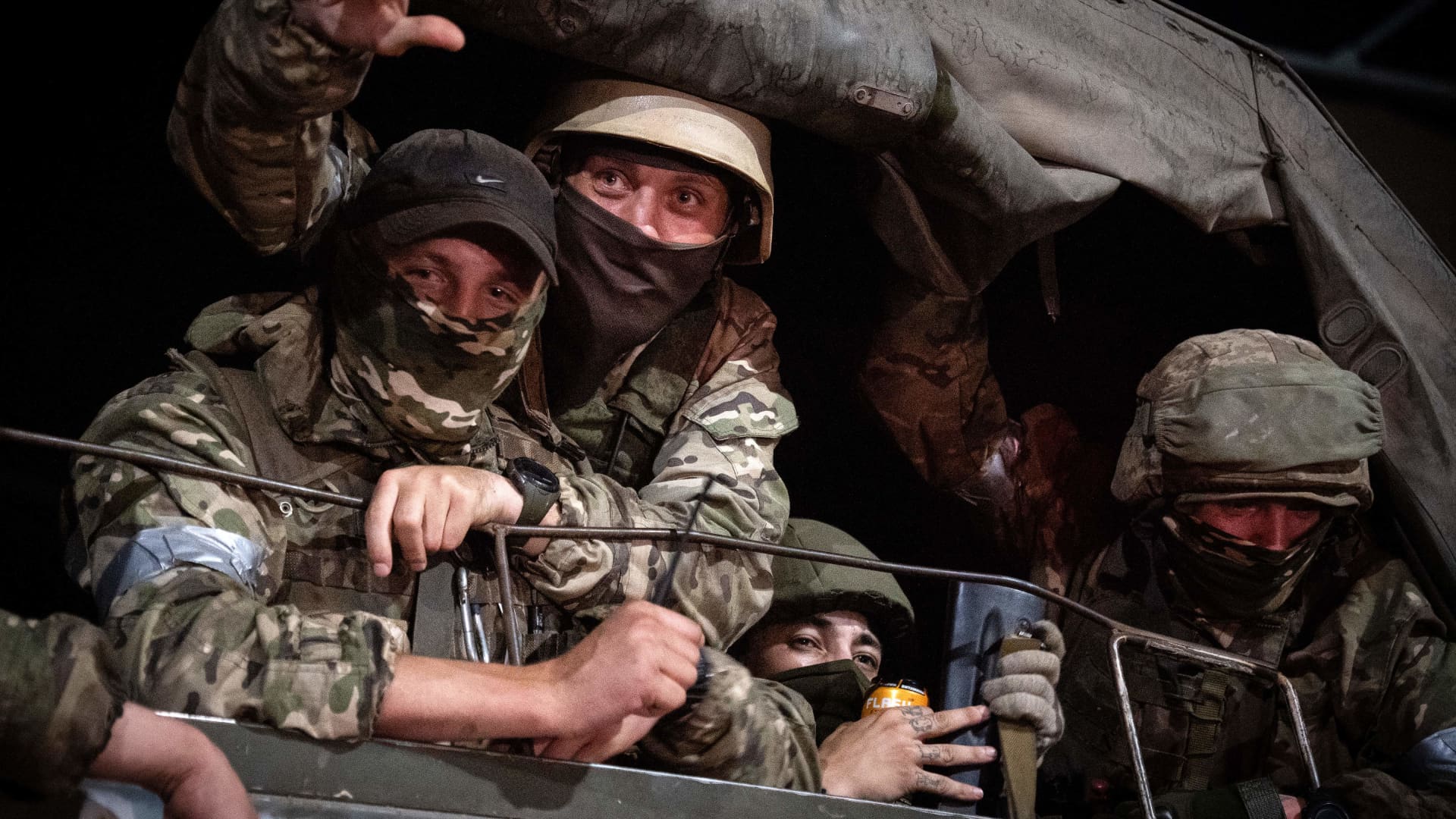Members of the Wagner group observe from a military vehicle in Rostov-on-Don late on June 24, 2023.
Roman Romokhov | AFP | Getty Images
The recent rebellion by the Wagner Group has exposed deep divisions within Russia’s military forces, sparking speculation about the future of the group’s fighters and the ongoing war in Ukraine.
In a matter of chaotic hours on June 24, the Wagner Group initiated an apparent insurrection by deploying an armored convoy towards the Russian capital. This event is considered by many as the most significant challenge to Russian President Vladimir Putin’s authority during his two-decade-long rule.
However, the rebellion was abruptly halted when Wagner boss Yevgeny Prigozhin agreed to de-escalate the situation and ordered his advancing fighters to return to their bases.
The aftermath of the rebellion has left many observers wondering about the future of the Wagner Group, both in Europe and worldwide.
The Institute for the Study of War, a US-based think tank, stated in its recent assessment of the Russian offensive campaign that the Kremlin might intend to take formal control of the Wagner Group and transform it into a state-owned enterprise. However, it remains uncertain whether the Kremlin will pursue this course of action.
Russian President Vladimir Putin meets with servicemen at the Kremlin in Moscow on June 27, 2023.
Mikhail Tereshchenko | AFP | Getty Images
The Institute for the Study of War highlighted that the nationalization of the Wagner Group could facilitate the Russian Ministry of Defense’s efforts to incorporate existing Wagner personnel into the regular Russian Armed Forces through contracts. However, the Kremlin has not explicitly expressed its intention to nationalize the group, and it remains unclear how it will assume firmer control over the Wagner Group.
On Tuesday, Putin publicly acknowledged for the first time that the Wagner mercenary group is entirely funded and supplied by the state. This statement reveals the extent of Kremlin’s involvement in financing the group.
The Institute for the Study of War also reported satellite imagery indicating the construction of a potential new Wagner base in Asipovichy, Belarus. The proximity of this site to a large Belarusian training ground suggests the possibility of Wagner personnel being deployed elsewhere in Belarus. However, the think tank emphasized that the presence of a potential base in Asipovichy is not unprecedented.
Wagner Group’s Prigiozhin arrived in Belarus on Tuesday after reaching an agreement with Belarusian President Alexander Lukashenko to leave Russia. Belarus is an ally of Russia in the war in Ukraine.
What lies ahead for Wagner’s fighters?
Analysts believe that the aftermath of the Wagner rebellion could mean the removal of Russia’s most effective unit from the war in Ukraine, potentially weakening Moscow’s forces on the battlefield.
However, the Pentagon has stated that there are still some elements of the Wagner Group present in Russian-occupied territory in Ukraine.
Pentagon spokesman Brigadier General Pat Ryder noted that the future deployment and employment of the Wagner Group will depend on Russia’s decisions, as they fund and control the group. He mentioned the group’s operations in Africa and Syria as well.
BANGUI, Central African Republic – March 22, 2023: A Russian flag hangs on the monument of the Russian instructors in Bangui, during a march in support of Russia and China’s presence in the Central African Republic. Wagner Group has been active in the country since 2018, supporting President Faustin-Archange Touadéra’s government and filling a security vacuum left by France.
BARBARA DEBOUT/AFP via Getty Images
When asked about the number of active Wagner fighters in Ukraine after the recent uprising, Ryder did not provide a specific figure but acknowledged the presence of some units. He stated that it is still too early to determine the full extent of the group’s involvement.
Christopher Granville, the Managing Director of Global Political Research at TS Lombard, cautioned against losing sight of the ongoing battle in Ukraine amid the analysis of what may happen next. Granville stressed that Putin’s political future hinges on the outcome of the war.
Granville predicted that the Wagner Group is likely to diminish in influence in Ukraine following the rebellion.
Russia’s political crisis
Russian Foreign Minister Sergey Lavrov dismissed questions about a political crisis, stating that Russia always emerges stronger from difficulties. He added that any doubts about Russia’s stability are the West’s problem.
Meanwhile, Russian General Sergei Surovikin, the deputy commander of Russian forces in Ukraine, is believed to have been detained following the Wagner revolt, according to the Associated Press. The report has not been independently verified, but it adds to the speculation surrounding Surovikin’s involvement in the uprising.
James Nixey of London’s Chatham House think tank emphasized that potential political instability within Russia should not deter Ukraine from taking advantage of its current position in the conflict.
Analysts suggest that the confusion among Russia’s military leadership can be exploited by Ukrainian forces.
Denial of responsibility! VigourTimes is an automatic aggregator of Global media. In each content, the hyperlink to the primary source is specified. All trademarks belong to their rightful owners, and all materials to their authors. For any complaint, please reach us at – [email protected]. We will take necessary action within 24 hours.


